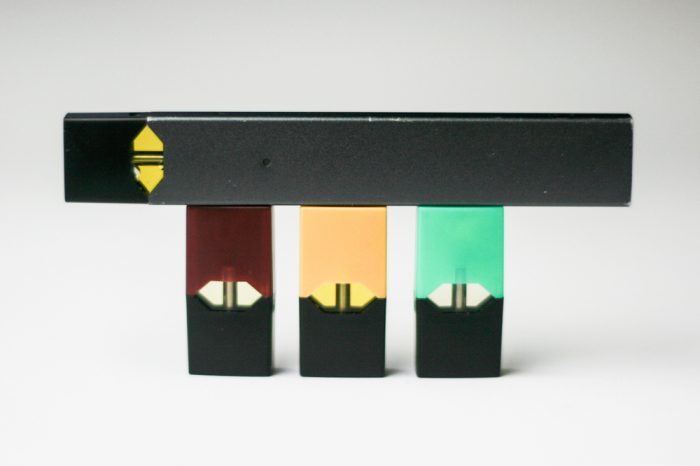The youth of today are reviving nicotine addiction and the government stands by.
Here’s a study in opposites: Juul pods and cannabis. One is a new, hip way to use nicotine. The other is a clinically proven cancer fighting agent. Teens are attracted to both of them, but only one is illegal in the US.
Juul pods are the most visible and teenager-friendly form of e-cigarettes. They are small, techy ways for consumers to get a hit of nicotine and exhale a giant cloud of smoke while avoiding the stink and (a few) chemicals present in traditional cigarettes.
And while our society has been moving toward cannabis and away from tobacco use, Juuls are a rare exception to the trend. They become more popular every year, attracting millions of new customers and high-dollar investments from venture capitalists.
It would seem that even the government approves given the lack of scheduling, despite the neurotoxic effects of nicotine and the medicinal benefits of pot.

Here’s a deeper look at how we got to this strange revival of nicotine addiction and what it means.
Juul Pods are Big Business
As long as teenagers have access to their parents’ money, businesses will find ways to take it from them. Selling an image to the next generation has been a guaranteed steady source of income for decades.
And if the recent $38 billion Wall Street valuation of Juul is any indication, the trend isn’t dying off any time soon. The valuation shows that investors are still ready to pick up what Juul pods are laying down. And what they’re laying down is a welcome mat for young people into a lifetime of nicotine addiction.
The tobacco industry has long known that the best kind of customer is an addicted one. After all, getting folks addicted early simply facilities more transactions over a lifetime.
And despite what they say, this is exactly what the makers of Juul pods are doing. At least, that’s what the attorney general of North Carolina alleges.
Juuls and the Laws
In mid May, the head cop of pro-tobacco state North Carolina vowed to take Juul to court on charges that the company is targeting teens and lying to the public about the dangers of vaping. The lawsuit cites a study showing that the teenage brain is more susceptible to the neurotoxic effects of nicotine, and that even small exposures to nicotine have profound, long-lasting effects.

The company has responded to the lawsuit by claiming that it has cooperated fully with all laws and regulations. It goes on to say that it stands in favor of so-called T21 laws, which raise the age of buying tobacco and nicotine products from 18 to 21.
But while Juul claims that “T21 laws work,” you could be forgiven for taking their claims with a grain of salt. If you’ve been paying attention, you know that tobacco companies have spent years denying plain facts, falsely asserting that cigarettes aren’t addictive, that nicotine isn’t detrimental, and that their ads have never been aimed at minors.
So why would the company be for T21 laws, and discontinue their flavored Juul pods (the kind most appealing to younger audiences)?
Despite these changes, the rates of e-cigarette use by teens continues to climb at a rapid pace. In the last six years, it’s increased over 900 percent! It’s possible that none of these changes will matter to today’s adolescents. The damage is already done. Juuling is cool. At this point, it’s too big to fail.
Juul – Designed Help People Quit Smoking?
The biggest difference between cannabis and Juul, other than the opposing health effects, is their monetary backing. Juul has the Big Tobacco machine behind it, armed with political connections and hefty bank accounts. The company commands a loud megaphone and a sophisticated propaganda arm. While it claims that Juul pods are meant to help adult smokers quit cigarettes, the results speak for themselves. And the company certainly didn’t do anything to try to curb teenagers’ adoption of e-cigarettes until they were called out for it.

The $38 billion valuation mentioned earlier? Experts think it’s a sign that the makers of Juul pods are gearing for another round of fundraising. It’s no coincidence that this happened after North Carolina’s attorney general decided to get serious.
Nearly every action Juul has taken has been late and reactive. That’s hardly the sign of a company that’s worried about the health of the nation’s youth.
Most of what we tolerate in society has to do with public perception, not scientific facts. Juul spends a lot of money to ensure that it’s on the right side of the perception issue. Cannabis has to rely on word-of-mouth cancer survivors and videos of epilepsy patients finding relief. But call to question this one thing: Should we be putting more money towards funding Big Tobacco? Or funding research that can provide evidence for anecdotal cannabis evidence?





